How can we continue to be inspired by a group of 18th century journaling travelers, the Linnaeus Apostles? And do we need new “apostles,” adventurous and curious generalists who defy categorization by scientific discipline, motivated above all to share with the world their rich observations?
These were questions that a group of scientists, scholars, and government officials pondered last November in Stockholm as they celebrated the completion of the IK Foundation’s 8-volume, 11-book Linnaeus Apostles series with the issue of Volume 8, the Encyclopedia.
In addition to the Encyclopedia, the seminar also marked the launch of the digitalized Apostles series – the full text of the volumes is now available for free online at iLinnaeus.org – and the establishment of the IK Workshop Society, which aims to broaden the reach of the Apostles’ works through free and open collaborations with individuals and institutions.
I was the only journalist to take part in the Linnaeus Apostles “ideas seminar,” held November 22, 2012 in the formal, sky-lit Second Chamber of the Swedish Parliament; all talks but mine were in Swedish. My fellow presenters have since shared with me distilled versions of their talks in English, allowing me to report here on what proved to be a remarkable gathering of perspectives.
“
And hopefully it will be used all over the world.
”
Early in the daylong seminar, former Swedish Prime Minister Ingvar Carlsson presented the full stack of red-jacketed books in the Linnaeus Apostles series to Susanne Eberstein, Speaker of the Parliament, in a gesture meant to signify, Carlsson said, that the series “is a gift to the Swedish people.” The fact that the series was produced in English, however, meant that it was intended “for the world and not solely for the home country of Linnaeus,” added Carlsson, who has worked to publicize and secure funding for the project since its inception more than a decade ago. “And hopefully it will be used all over the world.”
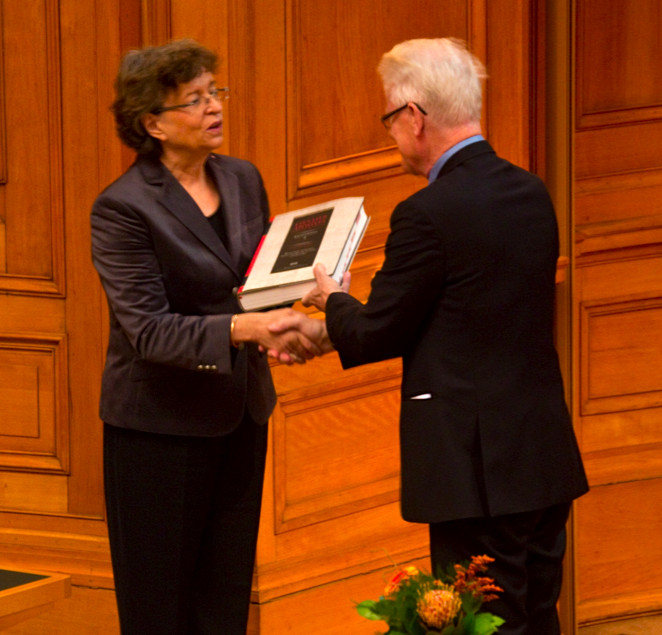
Former Swedish Prime Minister Ingvar Carlsson presented the full stack of red-jacketed books in the Linnaeus Apostles series to Susanne Eberstein, Speaker of the Parliament.
In accepting the volumes, Eberstein praised the interdisciplinary approach of the apostles, adding that “we have a lot to learn from their outlook. Their work was unrelenting, self-sacrificing, and covered all parts of the world.” She defined the challenge of the seminar as finding “what this knowledge is worth and what benefit can we draw from it in the future.” Perhaps what we need, she said, “are some modern ‘apostles’ who can understand our common planet.”
Further presenters elaborated on what a modern apostle might comprise. Is the apostle a scientist, or might he or she be a nonscientist? The Linnaeus Apostles themselves were physicians and clerics as well as naturalists – the 18th century made far less of such distinctions than subsequent centuries would.
Lars Hansen, the director of the IK Foundation and the series’ editor in chief, remarked that he thought the modern apostle could mean a more interdisciplinary type of scientific researcher, bringing broader approaches to both practical field work and theoretical studies.
I reviewed the apostles series for
The Wall Street Journal in 2011, and, speaking at the seminar, discussed the ways I have begun to see the volumes being used by other writers of non-academic books and articles in English. I felt, and still feel, that the series could be better exploited by writers on natural history and exploration, now that the texts are available for free online.
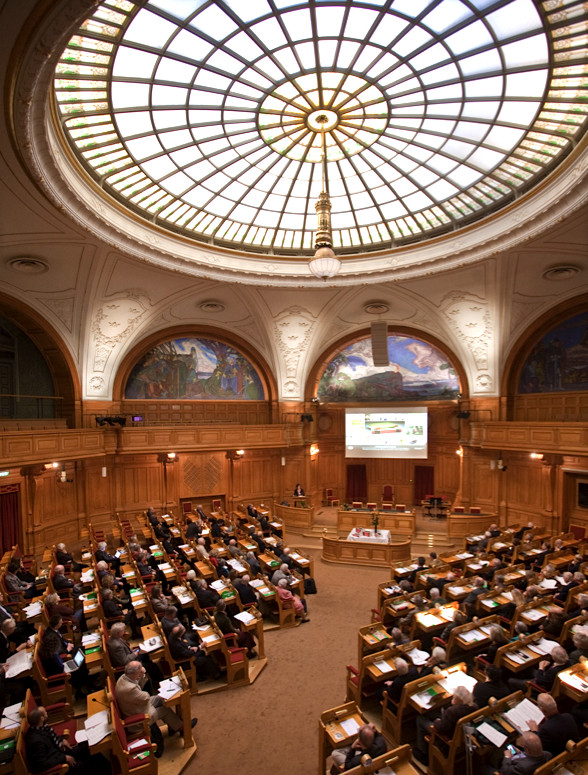
150 guests attended the ideas seminar.
I also praised - both in my review and in Stockholm - the apostles’ generalist sensibilities as one of the reasons their journals remain exciting to read today. In the introductory volume of the series, she noted, are Carl Linnaeus’ formal instructions to travelers, which include the memorable directive that every apostle ‘should imitate nature in such a way that anyone reading the description may feel as though they had the objects in front of their eyes.’ These instructions have proven an immense gift to later generations of readers.
During the second half of the seminar, scholars described detailed recent research in which they have made use of the Apostles series and related texts.
Over a lunch inspired by 18th century seafaring recipes – Captain James’ Cook’s larder was consulted – Gunnar Broberg, professor emeritus of Lunds University, introduced his translation with commentary of Carl Linnaeus’ remarkable if somewhat esoteric
Clavis Medicinae Duplex.
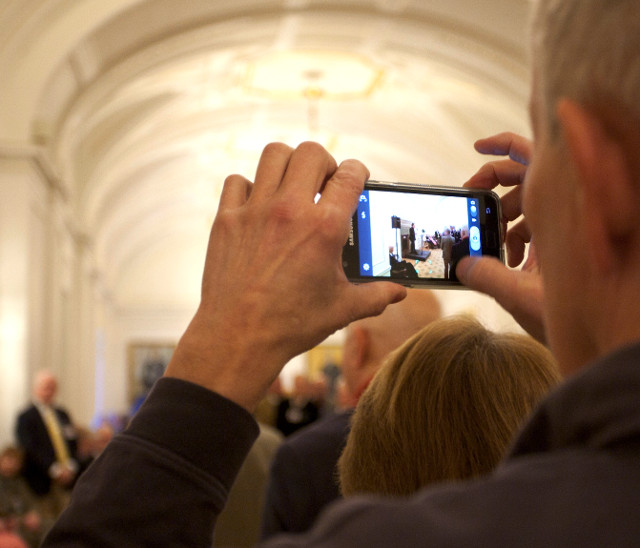
The introduction by Gunnar Broberg of the Clavis Medicinae Duplex was directly transformed in digital format.
In this challenging volume from 1766, Linnaeus, who like a number of his apostles was a physician, tried to systematize and classify different illnesses in much the way he had approached plants, “albeit with less success,” Broberg conceded. In the
Clavis Medicinae Duplex Linnaeus “is trying to find correspondences in the systems of the human body as well as in sicknesses as plants and animals and the structure of the world.” One could be a little hesitant about the results, Broberg conceded, but the work is testament to the humanity and continuing curiosity of the aging Linnaeus, who was “never satisfied, always wanting to know more. What he found out in the 1730s was not enough.”
Upon our return that afternoon to the Second Chamber, Arne Jarrick of Stockholm University recommenced the seminar with a sweeping and provocative discussion on the global economy over 250 years, paying particular attention to findings from the journals of Linnaeus apostle Pehr Kalm, who journeyed to England and North America from 1747 to 1751. The world at the time of Kalm’s departure was seen as “a static world of never ending zero-sum games over scarce recourses,” in which species were fixed in numbers and traits, linked to each other in a ‘great chain of being.’ This, Professor Jarrick explained, “was the established wisdom of the scholarly world, from natural scientists such as Linnaeus and his disciples, to the mercantilist economists of early modern Europe.” But from the end of the eighteenth century, the world and its inhabitants were gradually set in motion. “Everything was in flux and nothing fixed. The rusty old chain began to fall apart, and as it was replaced by the evolutionary tree; the static economy was made obsolete by a dawning faith in economic growth.”
The outlook lingers today, Jarrick continued, in a “naïve belief not only in economic growth but in infinite growth. So in spite of the dynamization of the world, we still miss a deep-going insight into the ongoing dialectic interplay between all species, mutually representing selection pressures to each other. Without such insights, there is a great risk that a feverishly changing world eventually comes to a complete standstill.”
The simultaneous issue of the final printed volume of the Apostles series and the series’ digital counterpart provided an opportunity to discuss the advantages and subtleties of each format. Professor emeritus Esko Häkli, the former national librarian of Finland, presented on the Linnaean heritage on paper, describing the methods used in the production of Linnaeus’ books, many of which, he said, “are still beautiful and of high physical quality in spite of their 250 years. It shows us how stable and permanent the old paper, produced out of rags, still is.”
Unfortunately, Häkli said, much of the paper produced over the past century is acidic, causing great problems to archives and libraries. However, production methods have changed, and today’s high quality paper will again be more or less permanent. The Apostles series itself was produced on high-quality paper from Lessebo paper mill in Sweden. This means “that the achievements of Linnaeus’ apostles will remain accessible for future generations, independent of all possible changes in the development of the new communication technology.”
Digital publications are in many respects very practical, particularly when they offer search capabilities, Häkli acknowledged. “But their stability or permanence is by no means secure, whereas we can rely on the stability of publications printed on high-quality paper. It may be a personal view, but the so-called user interface of printed publications cannot be surpassed by any digital solutions.”
In a somewhat irreverent response to Häkli’s paper- exalting talk, Mathias Klang, a scholar at the University of Gothenburg who specializes in questions of digital rights, technology, social media and culture, questioned the broad utility of a series of books that, he pointed out more than once during the talk, weighs some 30 kilograms.
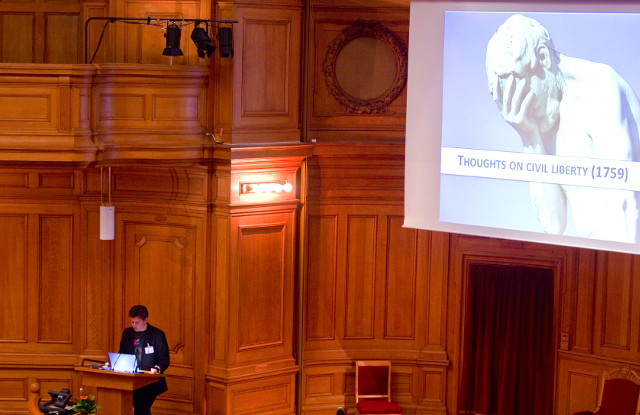
Mathias Klang arguing for digital and civil rights.
“Personally I love the printed book,” Klang said following the seminar, “but it’s a question of what people around us expect. Once you’ve done all this work and created this wonderful resource, if you’re not going to digitalize it and make it available you almost might as well not have done it.
With the Apostles series, comprising some 6,000 pages of text, a large-format print production was necessary – “I don’t see how they could have done it any other way,” Klang said. But subsequent digitalization was also essential, “and actually works in favor of a series like this. If you are already famous – as the Linnaeus apostles are -- the digital format will increase your fame,” he said. “And you can’t take books like this on a plane.”
While Esko Häkli had argued that we mustn’t forget paper, Klang said, “he is partly from a different generation and partly from a different idea. He’s arguing that because there’s no fixed position of knowledge or point of reference with something like Wikipedia, which is constantly changing, compared to a work like the Apostles series. But at the same time you could argue that if there’s an error in a book like this it’s going to be around forever -- no one’s going to read the errata list,” he said. Klang acknowledged that much as his task had been to defend newer formats, he valued the craftsmanship and the permanence of the Apostles series. “There’s just something about the artifact itself,” he said. “We wouldn’t have had a ceremony in Parliament to hand over a DVD or a USB stick. It just wouldn’t be the same.”
The seminar’s final talks addressed what for many remains the most challenging aspect of the Apostles legacy: understanding how their texts can inform contemporary modes of scientific research and investigation.
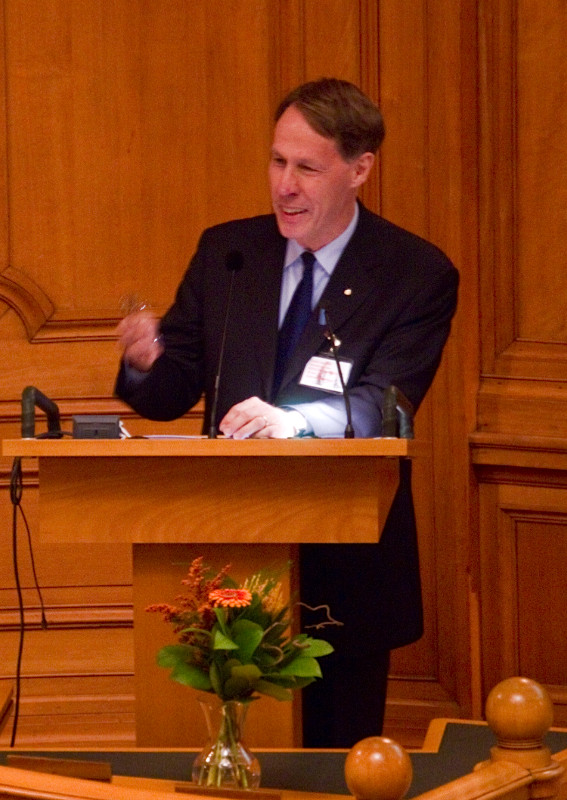
In his talk, Björn Wittrock, discussed the intellectual landscape where the Linnaeus Apostles existed.
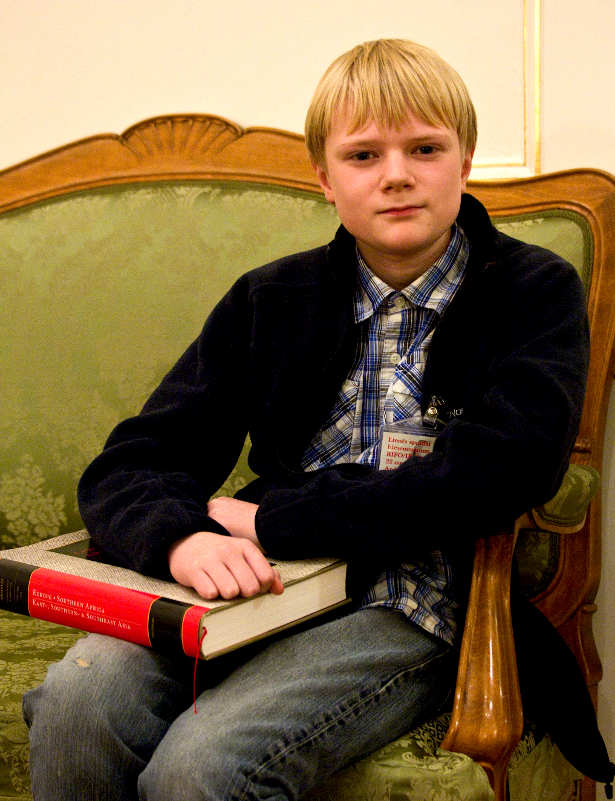
The youngest guest of the day, perhaps an apostle himself in the future?
In a talk titled “Interdisciplinary research and the world’s diversity: Linnaeus Apostles and the present day, Professor Björn Wittrock of the Swedish Collegium for Advanced Study spoke of academic investigation in particular. Humanity faces great challenges, he argued, and “the problems and burdens we stand against cannot be understood and even less be solved without the access to high quality research within sciences, humanities and social sciences -- something which depends on international cooperation.” Here, he said, the Linnaeus Apostles’ work can be seen as sources of inspiration.
“It is vital to once again promote cooperation across the divide between the branches of culture and science, but it has to be in occurrence with mutual respect and places for this to occur,” Wittrock continued. “I am convinced that the intellectual landscape within which the Linnaeus Apostles existed had this as its foundation – knowledge that I believe we should all take onboard!”
Concluding the seminar, parliamentarian and scholar Björn von Sydow argued for a broadening of the understanding of a modern-apostle beyond the context of sciences. Apostle-type generalists are hard if not impossible to find in the contemporary sciences, von Sydow argued, as science in general has become specialized and subspecialized in such a way as to discourage observations outside one’s defined discipline. The modern apostles, he said, may not be scientists at all, but authors of serious nonfiction books, or writers working for think-tanks, who have had the luxury of “apostle”-style generalism.
But von Sydow also said he hoped that the sciences, too, would once again harbor apostles. “How do you find organizational, ideological ways to broaden perspectives?” he asked. The Linnaeus apostles offered not merely inspiration in that regard, he said, but a plea for integration.



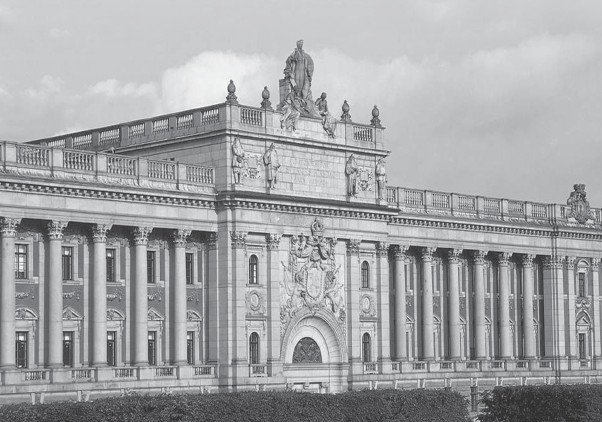

 The introduction by Gunnar Broberg of the Clavis Medicinae Duplex was directly transformed in digital format.
The introduction by Gunnar Broberg of the Clavis Medicinae Duplex was directly transformed in digital format. In his talk, Björn Wittrock, discussed the intellectual landscape where the Linnaeus Apostles existed.
In his talk, Björn Wittrock, discussed the intellectual landscape where the Linnaeus Apostles existed. Sveaskog, Stockholm, Sweden
Sveaskog, Stockholm, Sweden



